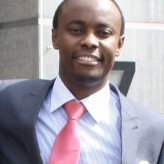Innovation, but how?
This might be holding you back
CC Erik Hersman
For VIA water, innovation is a big deal. It is the main thing we look for in a proposal, and yet it is the hardest thing to find. In our experience, being innovative is not as simple as it seems. Einstein is being contributed with having said 'We cannot solve our problems with the same kind of thinking we used when we created them'. But while there are some people that live and breathe creativity and for whom 'just thinking differently' is easy, for many of us this is a process we need to learn. So why is this? Why do so little people come up with ideas similar to making ice in the desert?
Well, one of the reasons, according to Professor Edward D. Hess on Forbes.com, is the fact that we are wired to be as efficient as possible. To be able to be so efficient, we try to put everything we see, hear or think in a box, so we don't have to assess everything twice. This is the reason we judge people by their appearance: although not a nice thing to do, it is very efficient - this way you can see which people to watch out for while walking at night in a dark alley, and which people would be nice to talk to when at a party. Imagine having to make a judgment starting from scratch with everything, every person and every situation you see: extremely tiring at the least. The flip side is that everything that doesn't fit into our neat little boxes or into our beliefs system, we try to ignore or rationalize. Being creative does not sit well with these traits. Our brain tries to ignore solutions or ideas that do not fit in with our previous beliefs.
Another key reason, according to Professor Jeff Degraff in an article in Fortune Magazine, is the fact that many of us are not taught to succeed through failure. Innovating means 'putting yourself out there': coming up with something that has a very high change of failing. It is very human to be afraid to stumble and fall, to want to avoid the shame of failure at all cost. This means it is often much easier to just do your day job and not stand out from the crowd, than to innovate. The way a society, and especially the education system, handles success and failure are vital in changing this. If you are taught to just sit still and listen in school, instead of being taught to think for yourself, it is much harder to think for yourself later in life.
Similar to this, innovating sometimes means disrupting the status quo, standing on peoples toes. Because again, people do not like situations changing: we like it when everything is as expected. If you are the one disrupting the situation, not everyone might like you for doing so. And that in itself might appeal to a fear you might have - the fear of not being liked, of being ousted from the group.
Lastly, as became apparent during Programme Manager Titia's latest travel to Mali, for many people it is simply a matter of time. When there are deadlines for real projects or a manager who wants to see results, it seems like there is never any room to free time for creativity. Especially when it is not yet clear whether this new idea might yield any results, and if so: when.
So, is all lost? Not at all. The beauty of this story is that, even though we are not wired to do so, some people still manage to come up with innovative solutions. One very important ingredient in the lives of these people is...other people. People that are also not afraid to fail, and not afraid to step on toes to get to where they want to be. But also people that are willing to confront you on your choices, and tell you the truth when you are on the wrong track.
At VIA Water, we would like to pair you up with those like-minded people, should you not be able to find them in your own environment. Contact us if you would be interested at info@viawater.nl, or join our Community.


